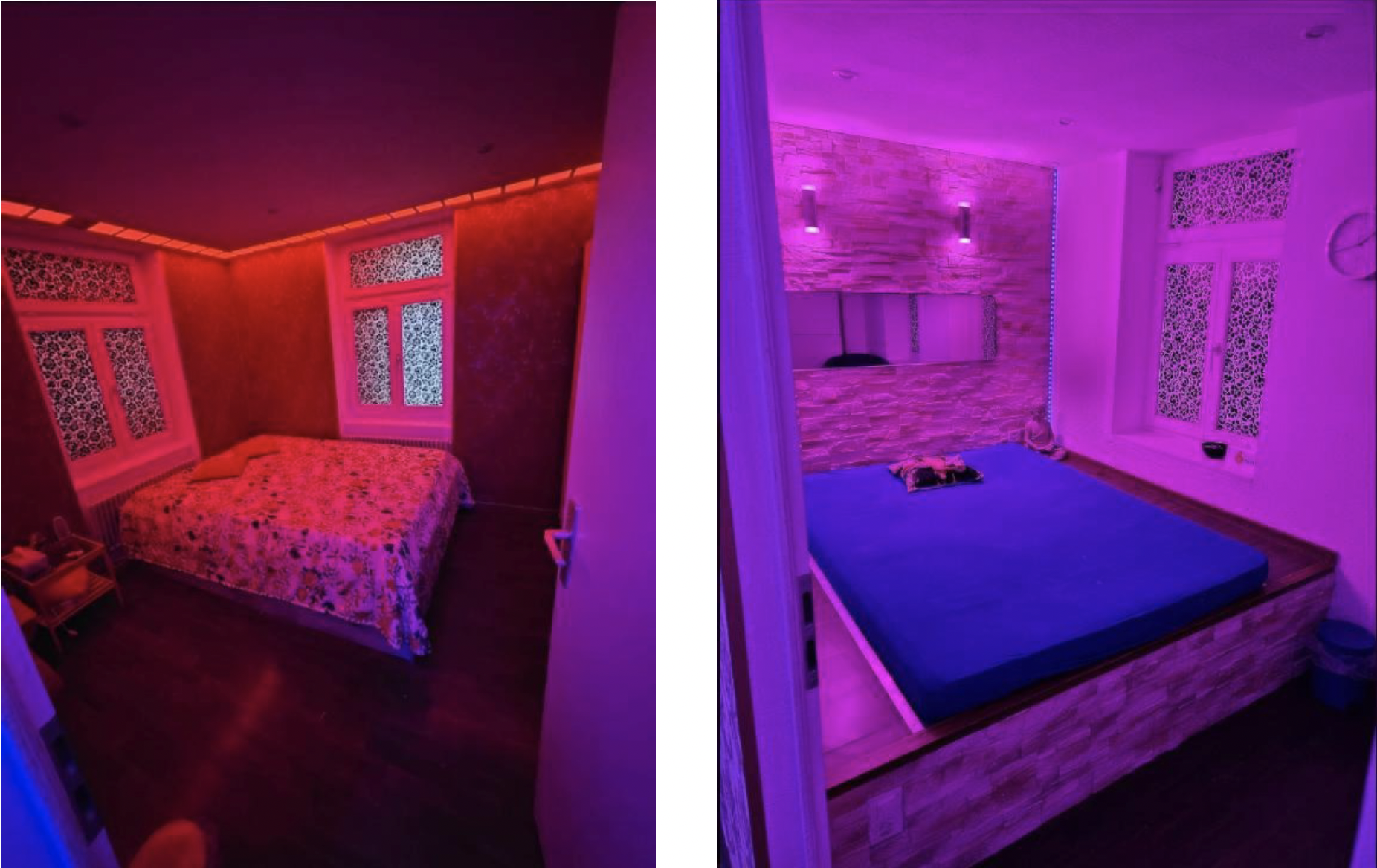“If you are new to this, I’ll see you through it all the way” – The internet is full of ads in Hungarian recruiting sex workers, but authorities see no problem with them

The ad, published in 2022 in Hungarian, may have even seemed innocent at first glance.
There is a picture of a blonde girl lighting a cigarette, with the caption reading “a multi-room private studio apartment in a prominent part of Lucerne, Switzerland, is awaiting pretty colleagues!” The ad doesn’t specify the kind of work involved, but there’s a pretty clear hint. It tries to lure applicants by claiming that “everything is handled by the owner”, even condoms.
Later on, it becomes even clearer what the ad is about. The bottom of the advertisement features a link to the studio’s website, which takes you to the Swiss website of an establishment where “very flexible, sweet girls discreetly meet your personal erotic needs“.
This ad was one of the 45,000 online sex work advertisements published in Europe in recent years, which Direkt36 examined as part of an international investigative project. The ads were scraped by a data journalist at the Dutch journalism center Pointer from a total of 34 websites, including Polish, Czech, Slovakian, Romanian and Hungarian ones.
The research showed that among the ads collected, those in Hungarian stand out. More than 6,000 are specifically targeting Hungary, almost twice as many as Slovakia and Romania.
Sex work has been legal in Hungary since 1999, but facilitating prostitution and profiting from the earnings of a sex worker is not. Hungarian laws apply to Hungarian citizens abroad.
However, opinions differ on whether these advertisements violate the law. The police told Direkt36 that such ads are illegal only in case they are misleading and the advertiser aims to exploit the sex worker. A lawyer who has represented sex workers for years, however, said that the advertisements do constitute the criminal offense of procuring. “The recruitment of sex workers, the posting of advertisements constitutes either procuring or the promotion of prostitution, depending on the specific content,” said Klaudia Makó. She firmly believes that any placement of this type of advertisement is illegal.
Help us tell the truth in Hungary. Become a supporter!
The international investigative project has revealed that people who apply for such advertisements often become victims of exploitation. As the Dutch partner in the project, Pointer found, the conditions described in the advertisements are often too nice to be true and there is a high risk that candidates will end up being exploited. According to the UN World Report on Trafficking in Persons 2020, the use of such misleading advertisements is on the rise. Of the 79 victims of cases that ended in court, 31 were recruited via the internet – via advertisements, social media and websites. The method is efficient, with 296 out of 472 victims lured by overly tempting conditions.
According to Europol’s 2020 Summary on Online Trafficking in Human Beings, online advertising is advantageous to perpetrators for several reasons. For example, they can recruit people without meeting face-to-face, and social media is a particularly effective means to target potential victims. Europol’s study also shows that criminals create impressive websites on behalf of fake agencies, which they then advertise on social media, targeting potential victims based on their age, location and social status. Traffickers in Europe can also exploit legal discrepancies, as the definition of what constitutes a sex work-related offense varies from country to country.
“There is someone to drive the girls”
The team of 31 journalists from 12 countries collected 45,000 advertisements calling for sex workers from 2014-2023, mainly seeking applicants for employment in Western Europe. From the ads we built a database that provides a detailed insight into the world of the people running the prostitution business in Europe. Thousands of Hungarian-language ads were used to lure sex workers to Switzerland, Austria, the Netherlands and Germany.
When analysing the ads, we found many advertisers who had been looking for sex workers for months, on several websites, and offering opportunities in several countries. The recurring advertisers mainly promised earnings up to several thousand euros per week, with transport, interpreters, advance payment of expenses, a super team, respectful clients and much more.
As in many cases, the initial search based on the websites and the phone numbers lead us nowhere, and inquiring as journalists also wouldn’t have got us closer either. We decided to contact them as a woman interested in the job. But to do this, we needed a credible story.
We created a young female character whose background and circumstances are similar to that of a typical victim of human trafficking for sexual exploitation. We relied on the help of social workers with experience in helping sex workers and victims of human trafficking.
The fictitious woman, Niki is 21 years old, grew up in state care and has never left her native county, Borsod. She has no big plans, but wants to be financially secure so that she doesn’t have to make ends meet as a low-paid worker. She is inexperienced, lacks self-confidence and wants to be loved. She has met local women who claimed to have made a lot of money as sex workers abroad, and it was these women who told her how to apply.
Aida Kokanovic of the Danish newspaper DR Nyheder, a member of the international project, helped create images of Niki using the AI image generator Midjourney. We then called 34 advertisers and agencies offering sex work opportunities to explore the reality behind the ads. Most of the numbers were unavailable or the advertiser did not answer the phone. Some of the people who answered our calls were very suspicious, but others were willing to answer. There were some who, although they had originally advertised work in Germany, were already looking for girls in Amsterdam.
In another interview, Niki was asked for a full-body photo, and if she could start in a week’s time in a red-light district abroad. Niki said that she didn’t speak any foreign languages, which, the friendly woman on the other end of the phone said, was not a problem, as clients communicate with the organizers.
“We can take care of everything,” the woman said, also explaining that they can arrange accommodation and transport for Niki.
“We can get you here, there is someone to drive the girls. I’ll advance you the fare and you can pay me back later. We can pick you up in Miskolc, no problem”.
The sex worker was to stand in the window awaiting clients, with the staff also advertising her online. According to the woman, workers are paid €100 for half an hour and €300 for an hour, but the hourly rate can go up to €600-1000. “If you want to make a lot of money, you need to provide more to clients,” she said.
The ads mentioned above are probably aimed at filling vacancies in brothels, but there are also agencies acting as intermediaries, only involved in recruiting. Just like companies looking for workers through recruiter agencies instead of advertising on their own.
The research, carried out by the international team of journalists has revealed that there are more than 100 agencies in Europe recruiting sex workers from Eastern Europe. One of these agencies is Meretrix, which apparently operates somewhere in the 13th district of Budapest, but the exact address and the identity of the company or person behind the agency are not revealed. In addition to their site, Meretrix offers sex work on several Hungarian job sites as well and looks for Hungarian women for brothels in Switzerland, Austria and Germany. Previously they have been looking for models for Hungarian porn agencies.
The head of a Hungarian model agency, who spoke on the condition of anonymity, told Direkt36 that Meretrix had approached them years ago promising to “bring girls”. Meretrix’s cautiousness was characterized by the fact that the head of the agency never met their representative. The porn agency’s director said that when he asked the women whether their agent was male or female, they replied that they had no idea as they had also communicated with them via chat apps.
Niki was in contact with the person answering the phone number listed in the Meretrix ads via Viber, too. The chat in Hungarian revealed that the person liked Niki’s photos and assured her that she would make good money in Switzerland. There was no beating around the bush: Niki could not choose her guests, she could only keep half of her hourly rate, although the tips for extras were hers to keep, and the more requests she indulged, the more she would make.
The Meretrix agent suggested a ten-day stay for starters. When Niki indicated that she was new to the business, she was told to that it would be easier if she thought about the money and that her insecurities would be gone by the second time she works.
Niki wrote that she was inexperienced and didn’t know if she would meet the guests’ expectations, but was encouraged: “you’re pretty, you’ll earn well” and was offered a real-life meeting.
Meretrix is also keen on comforting inexperienced applicants interested in the online ads. In one of them, it is specifically stressed that “If you are new to this, I’ll see you through it all the way“. Niki eventually agreed to board a minibus to Switzerland at Budapest’s Keleti Station on a Sunday morning in February, for which she had received a phone number and other details from Meretrix.
Direkt36 was there at the agreed time in the parking lot of Keleti station, watching as both male and female passengers boarded the white minibus. The bus takes anyone to Switzerland or back, and the bus driver’s phone number appears several times in a Facebook group for people commuting between Switzerland and Hungary.
We sent several questions to Meretrix’s email address featured in their ads. There was no reponse, but their website was subsequently taken down.
Another agency, Erotik Arbeit, which also recruits sex workers, promises earnings of 3,000 to 6,000 Swiss francs a week. The studios, which are open to “attractive young, slim girls” as well as “mature and experienced ladies”, are located in St. Gallen, on the triple border between Switzerland, Germany and Austria. The website is looking for sex workers for brothels such as WG47, Mon Cherie, City 48, Eros Escort and G2 Studio, the same places as the ones featured in Meretrix’s ads.
Direkt36, as part of the international project, has discovered that the website of the St. Gallen studios was created by the same man whose name is listed as the employer in a document uploaded to Erotik Arbeit’s website. In fact, a source with access to the Swiss commercial register confirmed to SRF journalist Léa Burger, who is part of the international project, that the man is also the owner of the studios. An official document revealed that at least 48 Hungarian sex workers were employed at one of the studios in May 2021. Their names have been blacked to protect them, but remain readable.
Erotik Arbeit not only provides jobs in brothels in Western Europe, but also a a way to get there. On Tuesday, Thursday and Sunday mornings, a minibus departs from the Keleti Railway Station and takes sex workers directly to the studios. For those staying for two weeks or more, the agency will cover the cost of travel. Based on the phone number and departure times, the minibus is the same that was recommended to Niki by Meretrix.
Illegal or not?
Direkt36 has sent some of the sex work ads to the Anti-Trafficking Unit of the Police’s National Investigation Bureau (KRI NNI) to get their opinion.
“In this form the advertisements do not constitute a crime,” replied the police, adding that the ads do not qualify as recruiting or procuring prostitutes.
From a law enforcement point of view, they said, “the advertisements in question raise an issue only if they aim to deceive and exploit the applicants“. Examples of deception and exploitation include asking sex workers for more money than agreed, withholding their earnings, telling them who their clients should be or restricting their freedom.
Dr. Emese Borsodi-Buss, a prosecutor at the Nyíregyháza District Prosecutor’s Office, who specialises in human trafficking and prostitution cases, agreed with the police’s response. In her opinion, the wording of the advertisements is too general, and profit as a motive is not explicit.

Rooms in the Swiss studio WG47 – Source: WG47
On the other hand, Dr. Klaudia Makó, a former lawyer of the Association of Hungarian Sex Workers (SZEXE) said that the Criminal Code is very clear on sanctioning all forms of enabling sex work: recruiting sex workers and posting advertisements, depending on the specific content, constitutes either procuring or trafficking in human beings. As per the New York Convention, to which Hungary is a party, sex work itself is not prohibited by law, but those who make a profit out of sex workers are committing a crime.
Makó recalled that in 2018 the Office of the Prosecutor General (OPG) issued a guideline that is still in force today and binding for all prosecutors. In it the OPG essentially calls prosecutors to classify certain acts of crime related to prostitution more severely, as trafficking in human beings.
According to the Penal Code, trafficking in human beings is also committed by “recruiting another person for work or labour (…) for the purpose of obtaining a regular benefit by deception (…) or by abusing the vulnerable position of the victim (…)”.
We got back to the police if, in light of the OPG’s guideline, they wanted to reconsider their position on the ads, but despite several requests they did not respond.
The president of SZEXE, Ágnes Földi knows from victims who contact her association that the more vulnerable a sex worker is, the more likely she gets ripped off in certain brothels abroad. The agent who recruited them, for instance, may claim up to €100 a day from their income or a one-off sum of several thousand euros.
In 2019, 134 Hungarian victims were registered, and 166 in 2022, based on the contributions submitted by the member states, said police captain dr. Bálint Kolozsi, Head of the Anti-Trafficking Unit at KRI NNI, in response to a question from Direkt36. He added, however, that these data are not to be considered complete, nor can police investigations always substantiate the victims’ stories.
In Europe, cases of cross-border trafficking in human beings are investigated by Joint Investigation Teams (JITs) of the police forces of the country where the crime took place and the country of origin of the persons involved. In October 2023 for example, three members of a family from Mezőtúr, a small town in Eastern Hungary were apprehended, who are suspected of recruiting seven young, vulnerable Hungarian women for sex work in Switzerland a year ago. According to the police report, the male members of the R. family made the victims engage in sex work by making them emotionally dependent on them. The victims were taken to Switzerland where they worked in brothels mainly in Bern, Lucerne and Zollikofen.
According to UN data, at least 1971 Hungarian citizens fell victim to trafficking for sexual exploitation between 2007 and 2020, with 178 Hungarian citizens detained in the course of investigations.
The prosecutor dr. Emese Borsodi-Buss told Direkt36 that in her experience those who work as sex workers in Hungary sooner or later end up abroad, and this also goes for the perpetrators who exploit them. By exploiting a single sex worker, perpetrators can make up to millions of forints a month. The most common destinations from Szabolcs County are Austria, Germany, Switzerland and sometimes England. Borsodi-Buss said that there is a pending case at the Nyíregyháza Court of Law with 11 defendants, accused of procuring and trafficking. The traffickers used to employ women in a legal brothel in Hamburg. Borsodi-Buss worked with the Hamburg prosecutor’s office through the Eurojust system.
“I was involved in the search for the Hamburg brothel, which was a serious German police operation involving special forces,” she said.
There is, however, a huge latency in the number of victims of prostitution-related crimes. According to Borsodi-Buss, there are several difficulties victims face when it comes to seeking help. The victim is often emotionally dependent on the perpetrator, so it does not even occur to them to confess. The lawyer Klaudia Makó also said that there are many cases, but they are very difficult to detect. The law does not consider the sex worker a victim, yet her confession is paramount to prosecute the perpetrator. But such confessions are hard to get, says Makó, since those who do not work under duress have no interest in exposing their pimps. Another complicating factor is that the defendant’s lawyer can ask the judge to summon the victim. The victim often has to meet the perpetrator after the traumatic events. According to Borsodi-Buss, in such cases, it is now possible to question victims remotely or to request that the interview take place in the absence of the perpetrators. “These options are increasingly being used by judges,” she added.
“They might kill me, but I’m getting out of here”
This is what happened to a fragile woman, now in her late twenties, who was trafficked in Denmark.
“I still wonder, at night, why it happened that way. I keep thinking that I was stupid. I’m very hard on myself. I am very angry with myself” – the woman, who asked not to be named, told us.
The woman said that in 2019 she kept fighting with her partner and they were separated for a while. That’s when a man came into her life, sending her a friend request as a stranger on Facebook and comforting her with kind messages and video calls.
“At the time, I needed the support, it was just the right time to have someone who spoke my language. I felt like wow, something was about to happen with him,”
she said, adding that the man posed as a real estate agent abroad and was very persuasive when talking about his work and intentions.
The man convinced the woman, who had never been abroad before, to meet him in Denmark. At the airport she was met by a group of men and began to feel that something was off. “When we got to the apartment, I was even more shocked because there were already two girls there. One of them was in a back room, with strange noises coming out. I asked if “people were really having sex there,” she recalled, adding that she was told to “relax, you’ll be changing in a minute”.
She trembled for days, couldn’t eat and felt sick after realizing what kind of danger she was in. One night, her Hungarian-speaking madam was severely beaten by the father of the man who led the criminal organization because according to him she did not do something right. The madam was taken to wash herself by the other sex workers.
“I never got a penny of what the customers paid. I was put out in front of them, they chose and we had to go. I got picked, I went, I bathed, got picked, went, bathed. They also took me out to forest areas. I feared for my life all the time”, she recalled.
“Then came the fifth day. I was taken to an apartment with men inside. There were several of them, some drunk, some high on drugs” she said, adding that she had to spend two hours there. She found out that her picture had been posted online as a sex ad weeks before she even got to Denmark. The photos were taken from her Facebook account.
The next day she was very sick, vomiting all day, but was still forced to have sex with customers. „I was like OK, they might kill me, but I’m getting out of here. Even death can’t be worse than what I went through” she said, and then went on with the account of her escape.
She pushed away two women associated with the criminals standing in her way, and ran out into the street, waving down the first car. There was a couple inside, and as she spoke some English, she was able to explain that she had been kidnapped and needed to go to the police. The couple put her in the car, and she ducked for cover in the back seat. They drove her to the police station and stayed with her until she gave her statement. In the meantime, her phone kept ringing and she got messages – first nice, then threatening.
Help us tell the truth in Hungary. Become a supporter!
Later, as part of the Danish court proceedings, she was required to give a video testimony at the Danish Embassy in Budapest. Her abductor was in the courtroom, and they could see each other through the video. The man eventually received a 10-month sentence. “He had this satisfied look on his face as if he was saying I got away with it. “ After serving the sentence, the woman saw him once at the local supermarket. Although months after the incident she still had panic attacks, her story ended well: she lives with her former partner and their children, trying to put the trauma behind them.
The “loverboy” method
The woman forced into prostitution in Denmark fell victim to a well-known tactic. According to several Hungarian experts in the field, perpetrators most often use the “loverboy” method to ensnare their victims: they seduce them by pretending to love them, only to force them later into sex work or at least persuade them to do so.
Dr. Szandra Windt, a researcher of human trafficking at the National Institute of Criminology told Direkt36 that it is common for perpetrators to ensnare their would-be victims via social media. She said that in most cases victims are young women in their twenties from poor family backgrounds who are looking for love, and often all it takes is a few kind words and the promise of a better future to make them fall for human trafficking. She said that in many cases pimps procure one or two women at home first, and when they see how much money they can make, they go West. Captain dr. Kolozsi of the KRI NNI elaborated on this to Direkt36, saying that criminals often exploit young victims’ hopes of a better future by manipulating their emotions.
“It is common to use social media platforms to contact, fake love and build a closer, trusting relationship with the victim,”
dr. Kolozsi wrote, adding that the online space provides increased anonymity, greater mobility, less financial investment and human resources for perpetrators, and allows for the exploitation of loopholes in the different national legal systems. This plays a major role in the fact that traffickers arrange work for victims abroad, as it is legal to run brothels for example in the Netherlands or Switzerland, but not in Hungary.
The “loverboy” method does not only work online. Máté Tóth, a worker for an organisation that helps victims of human trafficking, told us about his experiences in one of their shelters, whose address is secret and which, when you drive by, looks like a perfectly ordinary apartment block. According to Tóth, most of the victims grew up in foster homes, without a family.
“The institutions are surrounded by herds of pimps and loverboys. These girls are looking for a family and love, and are easy to seduce with two nice sentences. Then they escape, and are grateful for the pimps.”
Tóth says it’s common to be led to believe that they’ll make a living abroad in a year and live happily ever after, but in reality, they’re sold as soon as they leave.
This was the case with one of our sources, who told Direkt36 her story. The young, thin and very shy woman had been with her former partner for eight years, whom she had met in a foster home and who eventually persuaded her to become a sex worker in Germany. He promised her that she could earn enough money to buy their future home in two weeks. Her partner, who was part of a criminal organization, arranged everything for her, from travel to clients and relocations. The two weeks ended up being two years in total, and the woman did not get a penny of the €6-8,000 she said she made a week. Half of her income was taken away on the spot, and she sent the remaining half home to her partner and his family. She was given an old mobile, the number of which was known only to members of the criminal organization.
She worked in a total of 8-10 German cities, the criminal organization moved her every two or three weeks, because it is a way to earn more money. After all, the returning customers of the brothels expect to be able to choose from a new selection of prostitutes. The woman we talked to was also featured on Ladies.de, Germany’s largest sex advertising portal that offers sexual services in 12 German cities.
Finally, on one occasion, when she was allowed to return to Hungary, she asked for help from an organization that rescued her from her former partner’s family. As it turned out, the man ended up buying the house she had dreamed of, but was never allowed to move in.
The online space favors criminals
As captain Bálint Kolozsi said, the online space also provides a huge advantage for pimps who organise Hungarian sex workers abroad. Apart from the “loverboy” method, they also use other means to profit from their victims.
One woman, who also asked to remain anonymous, told Direkt36 how she was tricked last spring by an online job advertisement seeking kitchen assistants. “I have nothing to be ashamed of,” said the victim, who was 39 when she was abducted last summer. Her previous job had just ended when she saw the ad on Facebook for a job in Germany offering €2,000 a month, plus accommodation and travel. No language skills were required, “it was almost too good to be true.”
The woman applied for the job by text message, and the perpetrators even made a video interview with her about the kitchen work, and then arranged to pick her up with a minivan. She travelled to Germany with 11 other women, each of them was dropped off at different locations. She was met in Buchenau by a man who promised to show her around the accommodation, but when they entered the room he immediately took her documents and the €800 she had on her.
The man held the woman for 9 days, beating and raping her regularly.
“He had already offered me to his colleagues and told me to go out to the street, but I didn’t get there,” she said and then went on to explain how she managed to escape.
The man, who, as the police later revealed was wanted for, among other charges, assault, returned drunk to the hostel one night, allowing the victim to take his keys, sneak out, and get help at a nearby petrol station. German police are still investigating the case. She returned to Hungary with the help of the International Organisation for Migration.
Cover photo: Somogyi Péter (szarvas) / Telex




